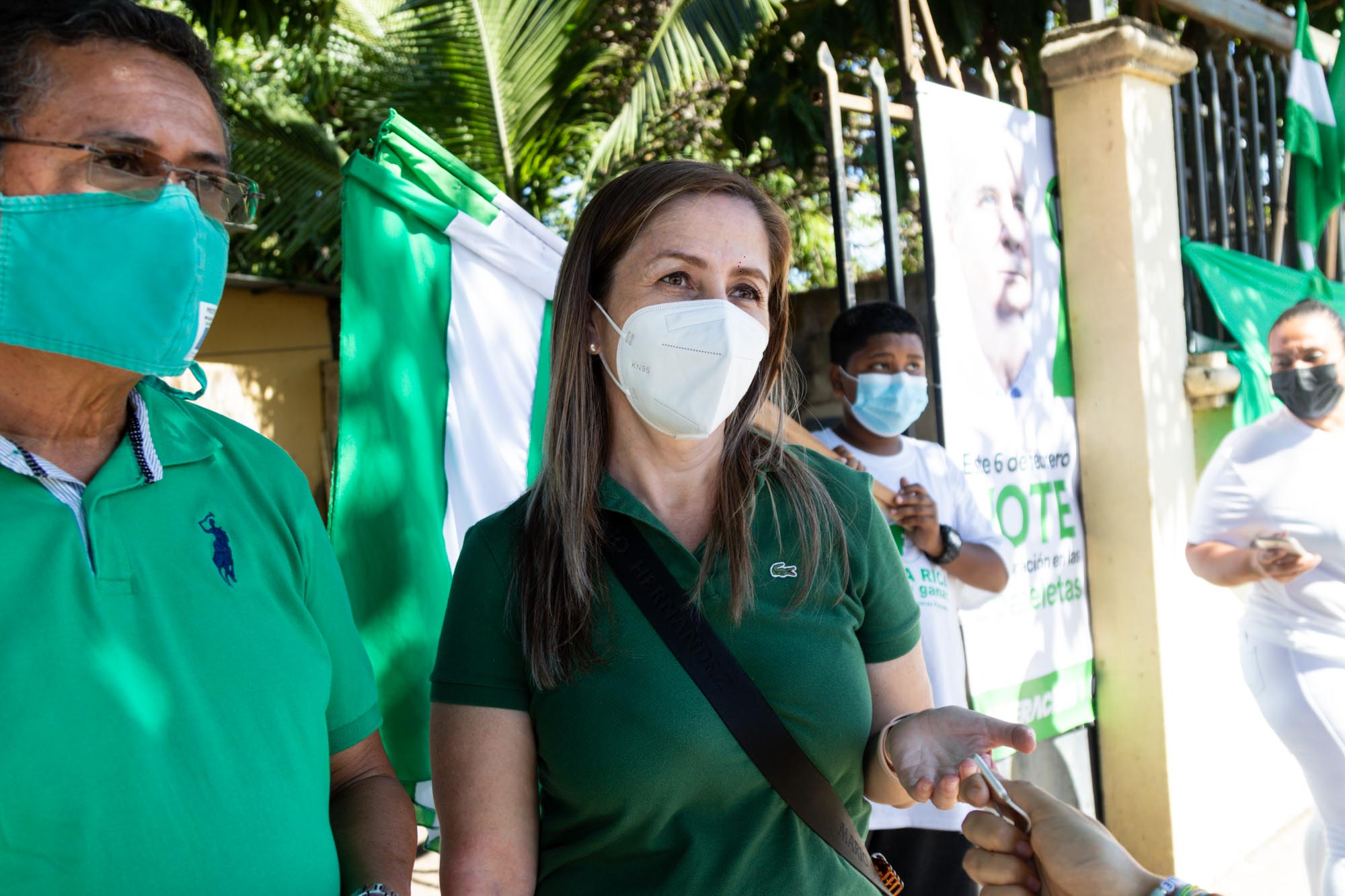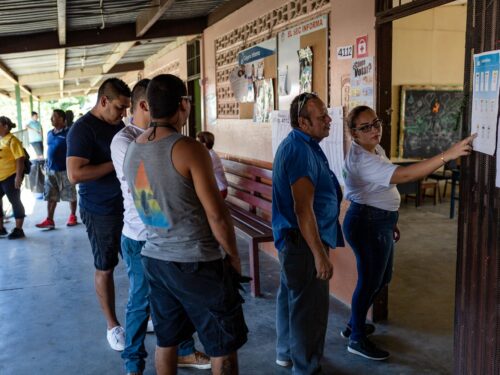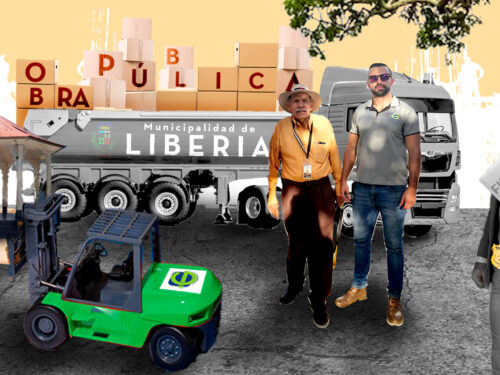
One of the main goals of Legislator Alejandra Larios is to create a legislative agenda in which women are a transversal axis. That was one of her promises during the campaign and the one that she intends to apply everywhere that she participates during the next four years.
She also presents that mantra in her office, where all of the people who advise her are women, many from Guanacaste.
Larios is still adjusting to her move to San Jose, away from Liberia, where she worked as a lawyer and teacher. “It’s an adjustment in every sense. It’s starting a new job with a new team,” said the lawyer during this interview conducted by Zoom, while she divides her time between extraordinary sessions and caucus meetings.
The legislator is a familiar face in the canton of Liberia. She was a proprietary council member with the National Liberation party between 2016 and 2020 and tried to get elected to that canton’s mayor’s office in the 2020 cantonal elections but lost by 172 votes against former mayor Luis Gerardo “Pipo,” from the Christian Social Unity Party (PUSC for the Spanish acronym). She also works as a professor of international law at the University of Costa Rica (UCR) at the Liberia campus.
During the campaign, Larios promised to work to strengthen the child care network and create new policies to make higher education more accessible in rural areas. Now that she’s in her legislative seat, she affirmed that she will also work hand in hand with development associations to strengthen them and will try to have an impact on internet access in the region.
In this interview, Larios analyzed the situation of rural women in the province and what her position will be as a member of the current administration’s opposing party.
How do you plan to keep your agenda focused on Guanacaste from the assembly?
My goal is that for the next four years, I’m going to be in the province on weekends. Mr. Fernando Mendoza and I are from the National Liberation party, and we have divided up the cantons for better attention. That doesn’t mean that I’m not going to serve the cantons that are not entirely my responsibility. The office will have the greatest willingness to welcome them, to listen to them and accompany them in any solution they need, in any of the 11 cantons of the province.
What would your work agenda be in this first year then?
From the office, we’re working on preparing bills that it just so happens have to do with revitalizing the economy and also with improving the conditions of Costa Rican women. We’re going to be working on projects to create jobs and improve the child care network, which is very important to us women. Unfortunately, we Guanacastecan women are leaders in unemployment and inequality.
One of the priority issues that you mentioned in the campaign and also in the session of former President Alvarado’s speech was unemployment in the province. What plans do you have to combat this problem?
The previous legislature approved the promotion of free trade zones outside of the Greater Metropolitan Area. To me, it seems to be a very important law that we’re going to follow up on. Those are very relevant laws, but we don’t do anything if we don’t regulate them.
I’ve always said in recent years that Guanacaste has everything to be the second development pole in Costa Rica. We have an international airport that we should make the most of: modernize it, expand it. On May 1, Mr. Rodrigo Arias mentioned a project with which I’m 100% in agreement and I’m going to support, which is to build a train between the Juan Santamaria and Daniel Oduber airports. That would be a win in every sense, because it’s going to facilitate transportation of Guanacastecan people and also for tourism and investment, it’s going to be extremely important.
What other projects do you think could work to revitalize Guanacaste’s economy?
In Guanacaste, we have the attraction that people want to go there to live and that will allow us to revitalize the economy. For that, we have to think about other essential issues such as water. If we don’t improve the issue of water availability, well, that’s going to complicate matters for us. That’s why I also celebrated former President Alvarado signing the Water for Guanacaste Law bill, which we’re going to follow up on.
Work on infrastructure, including technology infrastructure. In the previous legislature, the Digital Nomads Law was approved, which Guanacaste is extremely attractive for this niche, but if we don’t have internet, we won’t be able to have digital nomads. Within the party, we’re working on a project.
You’re the only legislator from Liberia. What can you do for the canton being in this position of power?
What I was telling you before, which is to work on the Daniel Oduber airport. Right now, it’s becoming too small for us and it can give much more than just to receive tourists. We should also strengthen it for cargo and exports. That would make it more attractive for companies to be close to the airport. Also working with development associations. I believe that that’s where progress in the communities is.
And how can you help these communities and people from the assembly?
First of all, I have to focus on the issue of gender. It’s much more difficult for us women and for women from outlying areas like ours, it’s even worse. The gender issue is always going to be important and I’ll try to make sure that dose of equality is in every law of the Republic that is approved in this legislature.
You’re from the largest opposing caucus. What will your role be as a regulator within the legislative branch?
In the Liberation faction, we have had clarity from the beginning. We’re open to dialogue, to sit down and talk. It’s not our intention nor one of our objectives to hinder the executive branch. But yes, be very vigilant of the actions that are going to be taken.
Guanacaste has historically backed the National Liberation Party, and in this second round, the province voted for the other party. What can Liberation learn from this?
More than Liberation hasn’t won in Guanacaste, I’m concerned about abstentionism. This is a disenchantment of people and it does worry me a lot that people have no hope. I think it’s time for them to feel that they’re being listened to and that what is happening to them is being worked on.
And how can you encourage that citizen participation?
One of those subjects for me is decentralization. How many times have the people of Guanacaste not dealt with a procedure that we can only do in San Jose and we come and they tell us that we’re missing a stamp, but they don’t tell us where we can buy it.
How do you plan to make alliances to promote these kinds of projects that help Guanacaste?
For a long time, and I’ve said it many times, we’ve been a very centralist country and in the end, all the provinces are important. I’m going to raise my voice every time they want to make decisions from a desk in the central plateau that are going to affect the people who inhabit the province in some way.
What will your position be on national issues such as public employment or the Escazu agreement? Will there be a personal position from your office or will you follow the position of the Liberationist caucus?
Within the faction, we have excellent communication and a responsibility to work in an orderly manner that’s also consistent with what we proposed to the country. I think we should follow that line and I’m not saying that at some point, I’m not going to go a different way. That can happen.







Comments